Dr. Paul T. P. Wong’s autobiography, A Lifelong Search for Meaning: Lessons on Virtue, Grit, and Faith, is published in weekly installments. Stay updated here.
I dare say that very few people have lived as fully, passionately, and productively as my father. Very few people could survive the highs and lows of his life without his resilience. I am most grateful to my father for teaching me by example important lessons of resilience.
By all worldly standards and measures, his life was very successful in terms of possessions, positions, and the achievements of all his children. He was able to enjoy all the fine things money could buy and indulge all his sexual fantasies. Many people would think that such a life is worth dying for.
Ironically, after living vicariously through his dream and observing the shallowness of his life and that of his rich friends, I developed an allergic reaction to the mindless pursuit of personal success and happiness. Even in my primary school, I knew intuitively that there was something missing in my father’s life.
At that time, I did not have the vocabulary for or even the concept of meaning in life. I just knew that life was more than money and happiness. I had a very different concept of living a significant and successful life—it is a life of pursuing a worthy cause that lifts people up from the level of the existence of mammals, a life of pursuing virtues or goodness that enables people to rise above the deadly traps of materialism and physical pleasures.
In short, my life orientation was determined in a very early age by not wanting to live like my father. Don’t get me wrong. My father was not a person totally devoid of virtues. I have to give him credit for practicing the Confucius virtue of filial piety and caring for all the members of our Wong clan.
A Model of Filial Piety
According to my mother, Father was a loving and respectful son all his life. Even when he was married and with children, he still handed over to his father all his earnings, which were substantial, because in the traditional feudal system, the head of the family made all the decisions and had total control over budgetary matters. He did so dutifully and willingly. In return, my grandfather would give him a small allowance each month.
When we were still in China, my parents would show ancestor veneration on the birthdays of grandparents and the anniversary dates of their death. These ancestor worship rituals would involve burning incense and offering fruits and cooked foods. I also remember that we all helped make shoe-shaped imitation silver ingots (yuanbao) with silver paper. These paper yuanbao would then be set on fire as offerings so that my grandparents who would have plenty of money to spend in “the other world.”
Father also treated every member of the Wong clan with generosity and kindness. He supported his younger brothers and sister until they no longer needed his financial help. He would give money to any stranger who claimed to be a distant relative. In fact, his blind devotion to his family got him into trouble many times. My third uncle was very impulsive and loved risk-taking. He got my father into several very risky business adventures. The last one resulted in him being jailed and my father losing all his investments. This story will be told in another chapter.
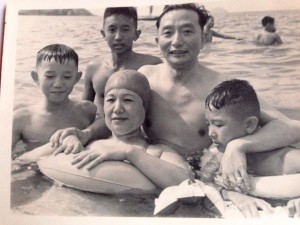 Although my father did not have much time for his children, he made a point of having a family day once a week, when we would do things together, such as going to the beach or having a good family dinner in a nice restaurant.
Although my father did not have much time for his children, he made a point of having a family day once a week, when we would do things together, such as going to the beach or having a good family dinner in a nice restaurant.
He was always keenly interested in our academic achievements. He would buy me anything I wanted as a reward for being the top in my class. This practice was discontinued when his financial situation took a nose dive. I was also grateful that he encouraged me to take up violin and painting. Those private lessons have greatly enriched my life.
I am still troubled by my parents’ marital difficulties. Since theirs was an arranged marriage, I don’t know whether Father really loved Mother. His proclivity towards infidelity might not have revealed his true feelings towards Mother, because he bought her all kinds of expensive gifts over the years. I know, because Mother authorized me to pawn these gifts one by one during those days of financial hardship.
I have the feeling that deep down his heart, he really appreciated my mother’s sacrificial devotion to the family and her unwavering love for him. True love can soften stones; Father’s heart was not made of stone. In spite of all the quarrels and fights, he would never have agreed to a divorce, even if she had asked for one. I believe that he valued his family just as much as Mother.
Throughout all the crises and crossroads in his life, he made some wrong decisions. But he had always cared for his family. His actions and choices have shown that, deep down, he remained a very traditional family man. He never relinquished his responsibility for his family—we were his joy and pride.
At one time when I was a young man, I was angry with Father because of his unfaithfulness towards mother. But, looking back, I saw a man who lost his way in search of happiness and fulfillment. I hope that he finally found what he had been searching for in his sunset years.
Survivor Par Excellence
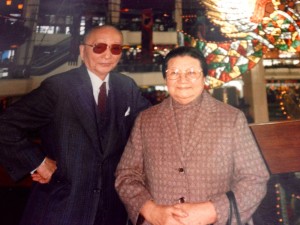 Father was born in 1905, the year of snake, an animal that portrays his characteristics quite well. He was very smart, with a quick mind and a phenomenal memory. There was always an air of confidence and dignity about him—he carried himself like a big shot. Even in his 80s, he still looked very sharp with his sunglasses and impeccably tailored three-piece suits. The following photo was taken in a mall in Hong Kong, on his 80th birthday.
Father was born in 1905, the year of snake, an animal that portrays his characteristics quite well. He was very smart, with a quick mind and a phenomenal memory. There was always an air of confidence and dignity about him—he carried himself like a big shot. Even in his 80s, he still looked very sharp with his sunglasses and impeccably tailored three-piece suits. The following photo was taken in a mall in Hong Kong, on his 80th birthday.
Some people, meeting him for the first time, have thought that he was an important government official or a business tycoon. He loved life and all the fine things in it. He not only tried to be the best, but also bought the best. His favorite expression was saying “tops” with two thumbs up. He took pride in being the best in the insurance business, the best as an importer, and the best dressed in the Chinese community. That is why he has instilled in all his children a sense of pride in achievement.
He managed to do quite well financially during the warlord regime, the Japanese occupation, the Nationalist Republic of China, and the civil war. Throughout his lifetime, he almost lost everything he owned more than once, but each time he was able to bounce back stronger than ever. He started a new successful career at the age of 75, when most people would have retired.
He was unsinkable. Neither disaster nor life-threatening illness could keep him down for long. He always found a way to come back, with new ideas and new lines of business. His resilience and tortuous career path mirror the history of modern China. Particiularly, with the demise of the Qing Dynasty and the increasing influence of Western powers in a fractured China, Father instinctively sensed that his future lay in doing business with the Americans. He graduated from a commercial high school and then studied English at an evening school.
His career began to flourish when he started working for American Asiatic Underwriters (AAU)* which was founded in Shanghai in 1919. He worked from the ground floor up, rose through the ranks quickly, and eventually became the sales manager in Tianjin. He chose to use his English initials rather than his Chinese name. That is why he was widely known as C. Y., the Insurance King in Tianjin.
According to Mom, he was already making 10 Yuan Shih-Kai Silver Dollars* per month when they got married, which was supposed to be a very good salary for a 23-year-old young man. As the oldest son, he carried a huge financial burden. During the first ten years of his married life, he was responsible not only for paying off Grandpa’s debts, but also for feeding the large extended family living together on a compound.
During the years of the Japanese occupation, he lost his main residence and suffered losses in his insurance business, but his printing press did well. He was able to get contracts from both the local Jockey Club and the municipal government.
After World War II, he began a prosperous import-export business, meeting the pent-up demand for Western goods. He was always ahead of his competitors in bringing in products from America. These were just some of the sidelines to his thriving insurance business.
He had an enormous capacity for hard work and multi-tasking. His best asset was his creative ways of doing business. For example, he would read the newspaper and listen to the radio and find out which VIP would be visiting or moving to Tianjin. Then he would learn all about that person, drive to the train station to meet him, and offer to help the new arrival get settled. Many of these connections later translated into insurance policies from Father.
A Model of Resilience
When we moved to Hong Kong in December 1948, he had to give up all his properties and businesses in China. He could only transfer to a Hong Kong bank whatever he could liquidate in a short period of time, because the decision to leave China was made at the eleventh hour. He had lost all his assets, and he hard to start over again.
Father used to be a very successful business man. Whatever he touched turned into gold. But he lost his golden touch in Hong Kong in a new and volatile business environment without the old connections. He got into partnership with some questionable characters from Shanghai, and suffered severe financial losses several times.
At one point, we were deeply in debt, and he had to go to Taiwan as an agent for several Hong Kong businesses, selling custom-tailors suits, watches and jewelry to American G.I.s stationed in Taiwan. He went there not knowing anyone, without any money, except some samples and his quick mind and convincing tongue. He made cold calls door to door and sold his products. What a relief when he began to send American money home through the mail!
His most remarkable success story was his new business venture at the good old age of 75. At that time, my sister bought him a nice condo and gave him sufficient money to live a comfortable life. However, he became increasing restless in his retirement. It was difficult to spend each day doing nothing except playing Solitaire card games. He desperately needed the challenges and excitement of engaging the marketplace and making deals. So, he found himself a part-time job helping out in a company that imported Italian marble and chandeliers. After a few months, he decided that he had learned enough about this business that he could easily start his own importing company.
Just imagine an old man walking the crowded Hong Kong streets and making cold calls from store to store. He first visited the list of contacts from his former employer, offering them a better deal. He then expanded his business territory by recruiting new customers. There was considerable risk involved. He had to deliver the goods before the stores paid him in full. His first shipment was worth $80,000 (US) and he would have been in financial trouble if he were unable to make sufficient sales.
His favored tactic was that he would not leave the store until he either made a sale or got physically ejected. Given the general respect Chinese people have for the elderly, most store owners would not have the heart to turf him out. Besides, he was a charming, well-dressed gentleman with a silver tongue. He could talk a flying bird into sitting on his palm! In most cases, his persistence paid off. Initial positive experiences in dealing with him led to repeat customers.
He had a telex machine at home and hired a young girl to assist him in keeping the books. He took great delight in monitoring the daily business transactions. His new adventure eventually grew into a multi-million-dollar business before he passed it to his favoured son, Giles.
Searching for a Miraculous Cure
Father survived two serious health crises. He began to cough out blood frequently in 1960. All the medical tests and treatments could not stop the bleeding. At one point, his condition worsened to the point of lying in bed with a high fever.
Mother was so desperate she was willing to try anything. One day, she saw a newspaper ad about a traveling monk from Japan who claimed to be able to cure all kinds of hopeless cases. So, Mother took me to visit this self-proclaimed miracle healer, which in Chinese meant “divine doctor” (神醫; shenyi).
We met this miracle healer in a hotel room. He was an elderly monk sitting lotus style. He spoke perfect Chinese. After finding out all the vital information about Father’s astrology, he pronounced that he was in grave danger of losing his life in a matter of days, unless we followed his dictates carefully. His instructions were as follows:
- Buy an ancient ink slab for Chinese calligraphy. The older the ink slab the better, but it had to be produced no later than the Qing Dynasty. Such ink slabs were available only in some of the oldest and largest Chinese herbal medicine stores.
- Upon receiving the ink slab, he would use a big brush and the ink slab to produce a heavenly decree on rice paper; nothing less could cast away the evil spirits that tormented my father. He would do the writing at 1:00 AM the following day.
- Precisely at the time of his writing, we must kowtow in the direction of the rising sun and pray to the Buddha.
So, Mother and I began to visit all the big herbal stores in search of an ancient ink slab. After several hours of searching, we finally found an ink slab with an imprint indicating that it was produced during the Qing Dynasty. The cost of this ink slab made our jaws drop—$500 (HK), which was a lot of money forty years ago. But we had to bite the bullet in order to save my father’s life. We then delivered the precious ink slab to the Monk, although I was not convinced that there was any healing power in the ink.
I also questioned the idea of praying to the Buddha at a precise time towards a specific direction, but I did it anyway in the hope of a miraculous cure for father. But Father’s condition got worse in spite of our faithfully carrying out the monk’s instructions. So we went back to the same hotel to enquire what else needed to be done. To our surprise, he was nowhere to be found. He turned out to be just one of those flight-by-night con artists, preying on desperate people.
A few months later, when my missionary friend and I prayed specifically for healing for my father, somehow, he recovered fully. Mother was really impressed by this manifestation of the power of Christian prayer. I believed that this was a turning point in Mother’s spiritual journey.
Father’s second health crisis shortly came after his 70th birthday. He had several complicated health problems which defied traditional medical treatment. He was near death until the former bodyguard of President Chiang Kai-Shek agreed to come to Hong Kong to try his qigong therapy on this “hopeless” case.
I had a brief meeting with this qigong master over lunch. He was a small elderly man with penetrating eyes. He gazed into my eyes for a while, trying to size me up. I did not blink. After a few seconds, he surprised me with this remark: “I can see that your spiritual kung fu is very deep.”
After a few treatments from this qigong master, Father began to recover. I believed that his recovery was due to a combination of medication, qigong, and intercessory prayers. After his release from the hospital, he began to take qigong and tai chi seriously. I could not believe the strength he gained from such daily practices. His usually flabby belly became as hard as a basketball, which could absorb my best punch. To show off his qigong, he often stuck out his abdomen and invited me to hit it as hard as I could.
He came out from this near-death experience a much healthier and stronger man. However, his health had already deteriorated during my visit to Hong Kong in 1990. One evening, when we two were alone in the sitting room, he said with such a sense of sadness, “What hope do I have? I don’t have much time left.” He looked towards the ceiling as if he had seen the face of death. This came as a surprise to me, because he had always been full of optimism and a zest for life.
I listened in silence. Death was sitting beside us. Death was in the room. I felt the angst and despair in his heart. What was he thinking? Was he regretting his wasted life, or was he terrified by death? How could I comfort him?
All his life, he had tried to escape the terror of death through his heroic striving for success and his endless indulgence in hedonic pursuits. But now, confronted by the inevitable bleak reality, he was engulfed by the darkness of his sorrow and fear.
“But death is not the end, and the invisible reality may be more real than this present world,” I said, as if trying to convince myself. “Christ has shown us that there is a different and far better existence beyond death. God is there and he will not abandon us. God will be with us even through the valley of death. We shall see Him as He sees us.”
He listened in silence. He had been going to church for many years with Mother after she became a Christian. He had heard the gospel many, many times. I think he knew exactly what I meant.
“Besides, your children and grandchildren will remember you,” I reassured him. “You have lived a full life and you will leave behind a good legacy.” He seemed to be deep in thought. Was he reflecting on his own life? Was he ready to embrace the end of his life?
His Glorious Exit
He died on April 9, 1991. At the service, I felt a heaviness in my heart, which was more than the grief of having lost a loved one. Something deep inside me was aching and grieving over the brevity of life and the bitter fate of those living through a tumultuous era of China’s history.
During those long, long years of being away from home, my parents were on my mind and in my prayers constantly. We traveled to Hong Kong from Canada as a family almost every year to see them. Each time, the parting was increasingly difficult. The last time we visited him, he no longer had the energy to see us off at the airport and his parting word was that he wouldn’t be around next year. It would be our final goodbye.
Each time the phone rang, we expected the worse. The bad news finally came in the dead of night. Even though long expected, it still hit me as something final, unchangeable, and tragic. Hong Kong could never be the same again without my father. My world would not be the same either. Death finally broke up the family, which had survived all the deadly blows of life.
He was probably honoured more in death than anytime in his life. The funeral was fitting for a VIP. Held in the biggest hall of the biggest funeral home, the funeral service brimmed with the kind of pomp and honor that had eluded Father all his life. The four walls were tightly lined with wreathes from floor to ceiling. All kinds of floral baskets and arrangements surrounded an open casket and overflowed to the doorway. An endless stream of people came to pay their last respects.
A large portrait of Father gazed down at the crowd through his trademark gold-rimmed sunglasses. He wore a tight-lipped half-smile, conveying a clear sense of self-confidence with a touch of distain.
Before the crowd arrived, I stood in front of the open casket for a long time. He was so close and yet so far away, separated by an infinite space and an impenetrable and invisible wall.
There he lay, all alone, in his smartly tailored dark gray pinstriped three-pieced suit. He looked smaller, but he was, at long last, at peace with himself and with the world. The struggles were over, so were the highs and lows in his incredibly long career that spanned 70 years! All his successes and failures, hopes and fears, happiness and pain, lust and frustration, love and hate would be buried with him six-feet under.
The church choir solemnly and softly sang “Abide With Me”:
Abide with me; fast falls the eventide;
The darkness deepens; Lord, with me abide;
When other helpers fail and comforts flee,
Help of the helpless, oh, abide with me.
Swift to its close ebbs out life’s little day;
Earth’s joys grow dim, its glories pass away;
Change and decay in all around I see—
O Thou who changest not, abide with me.
I need Thy presence every passing hour;
What but Thy grace can foil the tempter’s pow’r?
Who, like Thyself, my guide and stay can be?
Through cloud and sunshine, Lord, abide with me.
This music stayed with me for a long time, long after the funeral service. I sang it quietly to myself, because it brought me so much comfort and inner peace, knowing that in this chaotic world of suffering and death, God abides with me, and I in Him.
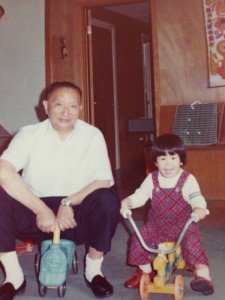
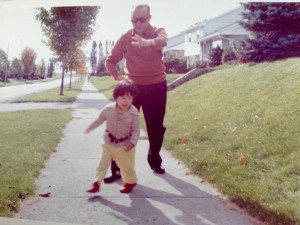
Now, writing about Father is give me an opportunity to get to know more about the person I hardly knew. We seldom saw him while growing up, except for the weekends. After leaving for Canada to study in 1961, I did not see my parents until 1971, while I was working at the University of Texas in Austin. He visited us in Peterborough when Austin was about 4 or 5. We had a great time together. Above is a photo of my father playing with Austin.
In 1993, when we visited my father’s burial place, my two children stood before the tombstone in silence and sadness. This was the first time they experienced the grief of losing a loved one.
As we stood before his tombstone, I said silently, “Thank you, Dad, for your love and for all the lessons and inspiration from your life.”
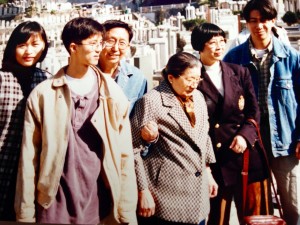
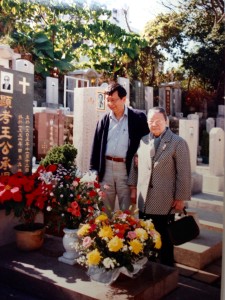
Notes
*Yuan Shih-Kai became the first President of the New Republic of China in 1912. After his death in 1916, the Warlord Era began. In 1914, the Yuan Shih-Kai Silver Dollar was issued. Initially, it was minted in Tianjin. It became one of the most widely circulated and most trusted coins in China for more than 20 years after his death.
**AAU later became American International Assurance known as AIA (美國友邦保險). It was based in Hong Kong, where my brother Joshua is now a district manager. Most of the visitors to the funeral service worked for Joshua. AIA is a member of the American Insurance Groups (AIG), which recently experienced a financial crisis.
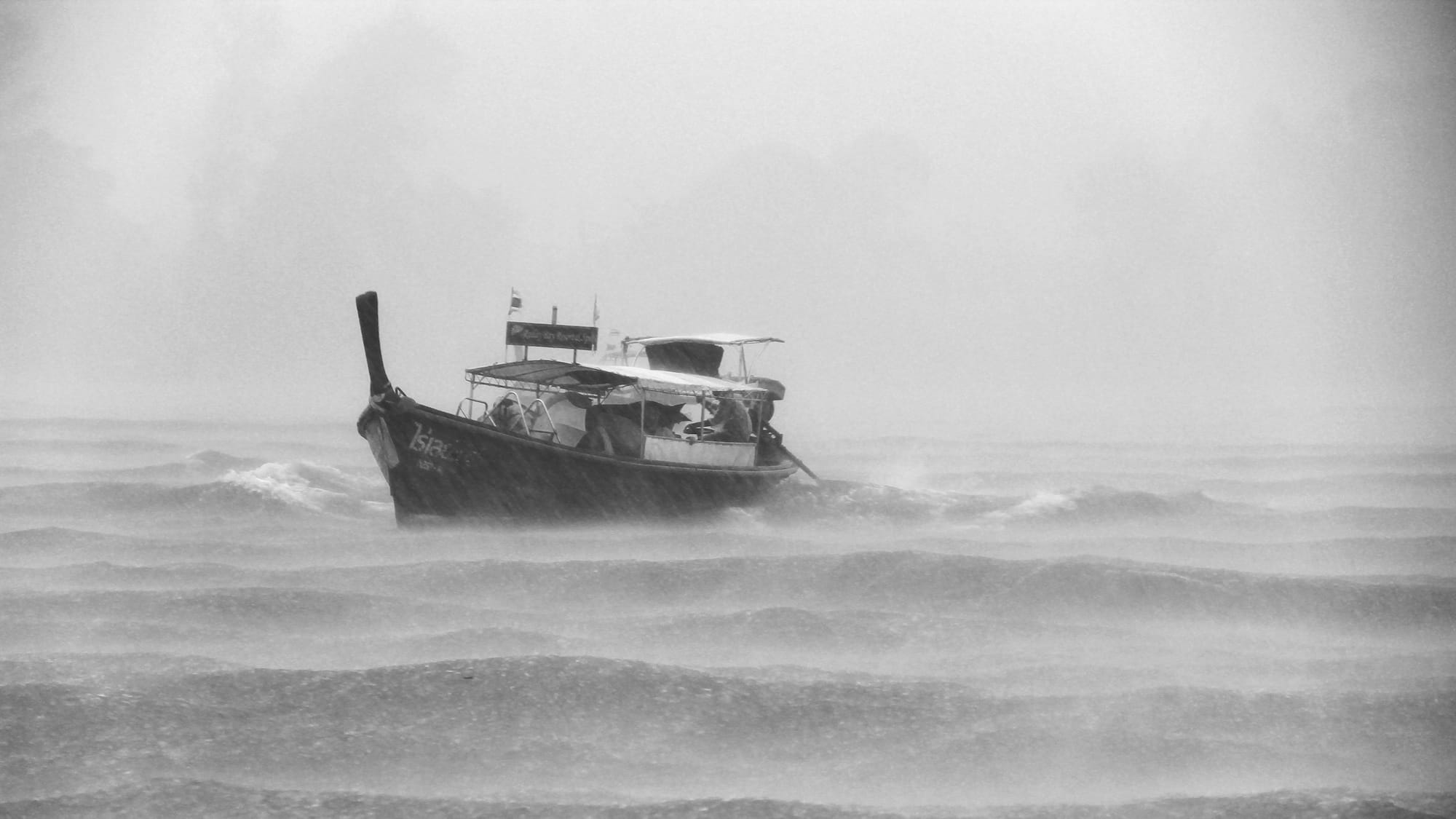
 Meaning Conference 2025 will be the INPM’s first in-person conference with a virtual option after the pandemic.
Meaning Conference 2025 will be the INPM’s first in-person conference with a virtual option after the pandemic.